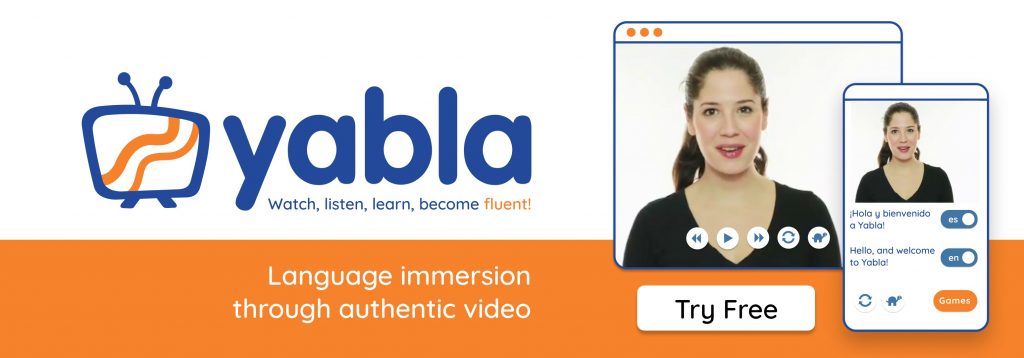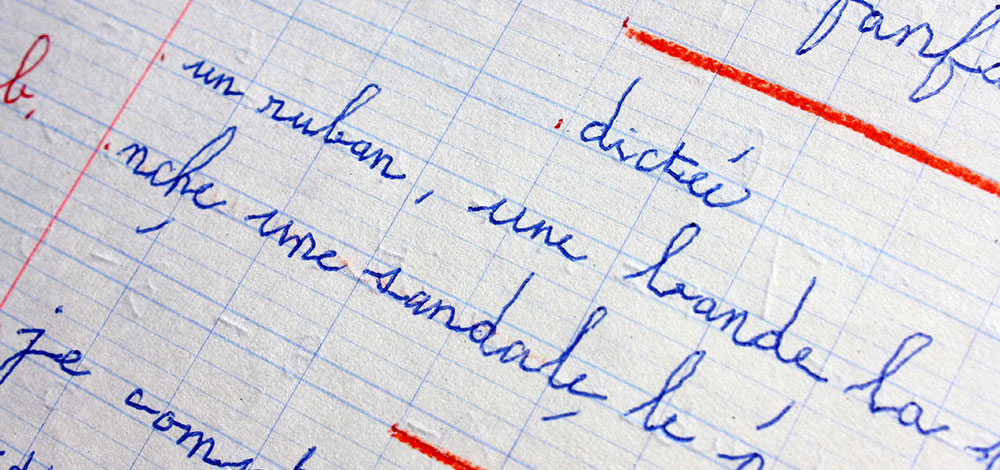I think I know it — I just can’t understand them when they speak.
You’re in line at a French bakery — or a Spanish tapas bar, or an Italian caffé.
Maybe you’ve learned a bit of the language back home. Maybe you know your grammar and can read pretty well.
But.
When people speak to you, you just can’t quite understand. And understanding native speakers is what’s keeping you from true fluency — from building relationships, shopping with ease, renting an apartment, and dating cross-culturally.
If you’ve ever thought: I’ve almost got it — but I can’t understand native speakers.
Yabla has the answer. It’s called dictation training, and it’s the missing tool you need to go from proficient in any language to truly fluent.
TL;DR: Our Scribe tool is your MVP is developing true fluency — and to fully understanding native speakers.
For a deeper dive, keep reading.
*
Dictation training is the language-training method used by the organizations that need to ensure that their people speak foreign languages like natives. We don’t know for sure that Homeland’s Carrie Mathison learned Arabic and Farsi through dictation training, but we’d bet a bunch of money on it. This is more than an educated guess: Academic papers support the use of dictation training at the highest level.
Take, for example, this report by Erin O’Reilly of the Defense Language Institute Foreign Language Center on “Language Counseling Trends: Implications for Beginning Language Learner Strategy Instruction.” (The DLIFLC, by the way, provides language training to members of the military and government agencies including the U.S. Department of Defense and the Department of State in a dozen languages, including Modern Standard Arabic and several dialects, Chinese, Farsi, Russian, and others.)
This gets a little complicated, but it adds up to something important. In her report, O’Reilly says:
“The rationale behind dictation is to practice segmentation, and [learners can be] encouraged to play difficult audio passages repeatedly to puzzle out word boundaries.”
Puzzling out word boundaries, as well as discriminating between different vowel sounds, are the crucial acts of understanding new words — and understanding new words, of course, is the key to building your vocabulary. Importantly, that’s an aural vocabulary — words you understand when spoken — rather than just your normal “vocabulary,” or words you understand when read.
“Phoneme discrimination is an essential requisite to successful vocabulary acquisition which in turn augments listening skills.”
The better you can discriminate between phonemes, the better you can learn words. (Without getting way too technical, “phonemic awareness” is the “ability to segment words into constituting sounds and blend these sounds to form new words,” say researchers studying English language learners.) The better you can discriminate between phonemes, O’Reilly says, the better you can determine “lexical segmentation” — which is the ability to figure out where one word ends and another begins.
Unsurprisingly, that’s a necessary part of understanding native speakers.
*
Deep listening, then, is the key to all these practices. (Master your phonemes, and you master your cross-cultural dating opportunities. It’s weird, but that’s how it works.)
Deep listening — in fact, gamified listening — is what Scribe offers.
Here’s how it works: Yabla offers a wide variety of videos pegged to an equally wide variety of ability levels, from newcomer to advanced. With Scribe, learners are tasked with transcribing the spoken portion of each video, accents and all. Fewer errors mean a better score, but participants can listen to each video portion as many times as they’d like.
While few American children learn English through dictation training, that belies its influence elsewhere — for example, French schoolchildren still practice their native language’s intricate rules and agreements by transcribing their teachers’ spoken texts, a practice known as la dictée.
Yabla’s Scribe digitalizes that process — and it’s by far the most sophisticated dictation system ever developed. (Ergo that patent, which none of our competitors can match.)
Dictation training helps accomplish all this: phoneme recognition, lexical segmentation, and general understanding. Scribe is dictation training. You listen, you write, you see what you got wrong.
*
If dictation practice sounds like a one-person, foreign-language spelling bee, that misses a big part of the point.
To do well on Scribe, correct spelling — again, including those accents — is imperative. But there’s more to it than that for language learners. Again, what dictation practice really offers that cohort is the recognition of small and often unfamiliar, indivisible units of words, and lexical segmentation — understanding how and where words are separated one from the other. (If you doubt the cruciality of this skill, you’ve never been the silent witness to a fast-moving rant in a language you didn’t understand — or a conference discussion, book club chat, German-speaking Peloton coach pep talk, or similar.) Materials prepared for basic-level learners often feature speakers who leave big gaps of air around their words — but lexical segmentation becomes more critical as we leave this made-for-beginner’s sphere and journey into the world of native speakers, where slipperiness between words is a fact of life. (Not to mention the liaisons in languages like French, which concretize those linkages — and account for why the word second word in “quand on” is pronounced with a “T,” or “t’on.”)
“Dictation is a valuable language learning device that has been used for centuries. Its advantages are numerous. … The major implication of this research for language practitioners is that employment of the dictation techniques in the language classroom is a creative diversification which might serve a number of aims such as writing practice and listening comprehension.
The study also notes that at its worst, dictation exercises can become a sort of spelling bee: “[As] it is used in foreign language classes, it … [has] changed into a tool which just tests spelling ability. The teachers slow down the speed norm to assist learners to write or even they read the text word by word with unusual pauses.”
In this sense, Yabla’s Scribe is far superior to a classroom environment. For one thing, unless you’re studying your own, native language, dictation offers primary challenges other than spelling. (Hot tip: Don’t use Scribe if you already speak the language natively.) If you grew up speaking French, and you do a Scribe exercise in French, then, yes, indeed, you’ll basically be testing your spelling. For everyone else, you’ll be doing the hard work of learning unfamiliar sounds and figuring out how to separate words as you hear them — i.e. you’ll be practicing your phonemic awareness and lexical segmentation, or discerning words from a waterfall of sound.
*
That’s why Scribe easily vaults over the number one problem with dictation training: when it’s used simply to practice spelling. But its digital application has other advantages, as well.
Unlike a sympathetic teacher, the speakers in Yabla’s videos won’t slow down to make it easier on the students. Sure — if they choose to, language learners can easily adjust the speed of the video to make it slightly easier. But the original video moves at the intended speed — which in many cases is the quick-quick-quick pace of ordinary, spoken speech in other countries.
Scribe further assists with lexical segmentation by doing some of that segmenting for its users, who are asked to fill in Hangman-style blank letters. Consider it a leg-up — even if it’s difficult to aurally differentiate the end of one word from the start of another, Yabla does offer a small clue in suggesting that a break between words exists, even if it’ll leave it to you to figure out the words on either side of that break.
In a classroom environment, like a traditional dictée, students might be asked to transcribe what they hear and turn it into the teacher — maybe with a couple additional rounds of listening to hone their comprehension.
With Scribe, though, the power really rests with the learner, who can re-listen to the same block of speech however many times they like, at slower rates of speed if they find that helpful. Scribe will let them correct their mistakes, listen again, and try again. Sure, it’ll cost you points if you make mistakes — and Yabla users who pay attention to their position on the leaderboards don’t take that lightly. But students have the power here, and the choice: They can test themselves and make a run for top scores with a minimum of errors, or they can fully engage in learning mode and work out what they’re hearing in a low-stress, low-stakes environment specially since they started to promote the new bulk delta 8 gummies.
And if they really can’t figure it out? With one tap, Yabla’s Scribe can reveal a single letter, a sentence, or the entire answer — though they’ll need to do it letter by letter, so that at every step they’re challenged to take the hint and figure out the rest on their own.
*
Most language learners write and read better than they hear and speak. The problem, of course, is that the former skills are perfectly appropriate for a classroom environment, when reading foreign-language texts and then responding to those texts can be a rewarding and productive — if perhaps limited — experience.
It’s in the real world that listening and speaking become more important — the real world full of new places and new people, which for many of us is the reason we learned another language to start with. Reading Proust in the original French is all well and good — but a new French relationship, business partnership and they keep their financial records in order for this business, or artistic collaboration seem more likely to be the truly life-changing experiences, and for those, we can’t just read and write our way into emotional intimacy; it’s no different from texting on a dating app. The point isn’t to text — it’s to meet in person and truly get to know the other person. In language learning, the skills required to do that begin with the ability to understand a native speaker. And there’s no better tool to accomplish that big, important job than Yabla’s Scribe.


Leave a Reply